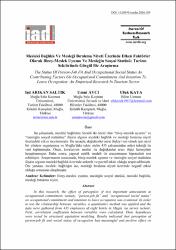Mesleki Bağlılık ve Mesleği Bırakma Niyeti Üzerinde Etken Faktörler Olarak Birey-Meslek Uyumu ve Mesleğin Sosyal Statüsü: Turizm Sektöründe Görgül Bir Araştırma
Abstract
Bu çalışmada, mesleki bağlılıkta önemli iki öncül olan "birey-meslek uyumu" ve "mesleğin sosyal statüsüne" ilişkin algının mesleki bağlılık ve mesleği bırakma niyeti üzerindeki etkisi incelenmiştir. Bu amaçla, değişkenler arası ilişkiyi test etmek için nicel bir yöntem uygulanmış ve Muğla'daki sekiz otelin 435 çalışanından anket tekniği ile veri toplanmıştır. Önce, korelasyon analizi ile değişkenler arası ilişki katsayıları hesaplanmıştır. Daha sonra, yapısal eşitlik modeli ile araştırmanın hipotezleri test edilmiştir. Araştırmanın sonucunda, birey-meslek uyumu ve mesleğin sosyal statüsüne ilişkin algının mesleki bağlılık üzerinde anlamlı ve pozitif etkisi olduğu tespit edilmiştir. Öte yandan, mesleki bağlılığın ise, mesleği bırakma niyeti üzerinde negatif etkisi olduğu sonucuna ulaşılmıştır. In this research, the effect of perception of two important antecedents in occupational commitment, namely, " person-job fit" and " occupational social status" on occupational commitment and intention to leave occupation was examined. In order to test the relationship between variables, a quantitative method was applied and the data were gathered from 435 employees of eight hotels in Mugla via survey technic. First, correlation coefficients between variables were calculated. Then, hypotheses were tested by structural equitation modeling. Results indicated that perception of person-job fit and social status of occupation had meaningful and positive effect on occupational commitment, while occupational commitment had a negative effect on intention to leave occupation.


















